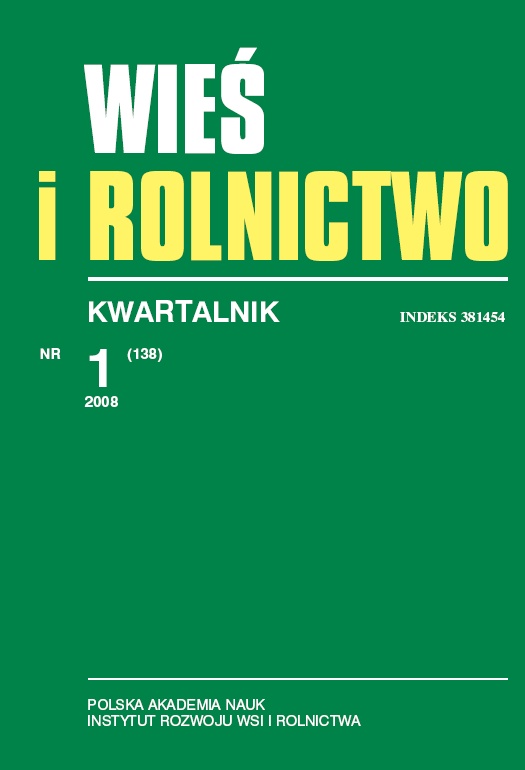Factors determining the introduction of a "garbage tax" in rural areas
DOI:
https://doi.org/10.53098/wir.2008.1.138/10Keywords:
household wastes, "garbage tax"Abstract
The aim of this paper was to determine the condition of waste management and the purposefulness of and chances for introducing a "garbage tax" in rural areas. In 2007 investigations were carried out in three communes situated in the southern part of Podlaskie voivodeship. The results of the conducted research indicate that the situation in respect of proper management of wastes generated by households has improved recently in the surveyed area. However, it is not satisfactory yet as evidenced by the fact that approximately 20% of the owners of real estate in rural areas have not signed any contracts for the disposal of wastes with specialised enterprises. Persons covered by research show a relatively strong interest in the participation in a referendum concerning the proposal to shift the duty of organising proper waste management from the owners of real estate to local authorities and to introduce a related "garbage tax". As many as 50% of the respondents declared they would certainly participate in such referendum, whereas 23% of the surveyed persons said they would most probably participate in it. Among the persons who declared their willingness to participate in the referendum as many as 54% would most probably support the imposition of a "garbage fee", provided that there would be no risk that such fee could prove higher than the costs of waste disposal borne by them at present.References
Czeluśniak R., 2003:. Program ochrony środowiska gminy Kalety. Maszynopis Eko-dom, Kalety.
Dyrektywa parlamentu Europejskiego i Rady Europejskiej nr 2006/12/WE w sprawie odpadów, 2006. Dziennik Urzędowy UE nr 114 z 27 kwietnia 2006 r.
Kozmana M., 2006: Podatek śmieciowy wraca. Gminy chcą pełnej kontroli nad śmieciami. Rzeczpospolita 26.06.2006 r.
Leszczyński S., 2001: Wybrane aspekty gospodarowania odpadami w perspektywie przyłączenia się Polski do UE. W: Gospodarka wodno-ściekowa i odpadowa w świetle integracji Polski z Unią Europejską. Red. E. Grygorczuk-Petersons. Wydaw. Politechniki Białostockiej, Białystok.
Majkowski R., 2004: Spalanie odpadów w paleniskach domowych. Skutki oraz zagrożenia dla środowiska i zdrowia ludzi. Kominiarz Polski 3.
Małecki P., 2006: Uwarunkowania i doświadczenia w funkcjonowaniu opłaty śmieciowej. Ekonomia i Środowisko 2 (30).
Matlak D., 2007: Spór o podatek śmieciowy. Ekologia 1.
Nussbaumer T., 2004: Dioxin – und PAK-Emissionen der privaten Abfallverbrennung. UmweltMateriallen 172. Bundesamt für Umwelt, Wald und Landschaft, Berno.
Ochrona środowiska 2006, 2006. GUS, Warszawa.
Rakiel-Czarnecka W., 2005: Śmieci – dowód na istnienie człowieka? Przyroda Polska 4.
Regulacje prawne Unii Europejskiej w obszarze gospodarki odpadami, 2005 (http://huby.seo.pl/13_recykling/131_kpgo.html ).
Regulamin utrzymania czystości i porządku na terenie Gminy Lipno, 2004. Załącznik do uchwały nr XV/80/04 Rady Gminy Lipno z dnia 6 września 2004 roku.
Uchwała Rady Ministrów z dnia 29 grudnia 2006 roku w sprawie krajowego planu gospodarki odpadami, 2006. MP nr 90, poz. 946.
Ustawa z dnia 13 września 1996 r. o utrzymaniu czystości i porządku w gminach, 1996. DzU nr 132. poz. 622 z późn. zm.
Ustawa z dnia 15 września 2000 r. o referendum lokalnym, 2000. DzU nr 88, poz. 985.
Ustawa z dnia 27 kwietnia 2001 r. o odpadach, 2001. DzU nr 62, poz. 628 z późn. zm.
Ustawa z dnia 29 stycznia 2004 r. – Prawo zamówień publicznych, 2004. Dz.U nr 19, poz. 177 z późn. zm.
Ustawa z dnia 29 lipca 2005 r. o zmianie niektórych ustaw w związku ze zmianami w podziale zadań i kompetencji administracji terenowej, 2005. DzU nr 175, poz. 1462 z późn. zm.
Downloads
Article file downloads
Pages
How to Cite
Issue
Section
License
Copyright (c) 2008 Wieś i Rolnictwo

This work is licensed under a Creative Commons Attribution 4.0 International License.










